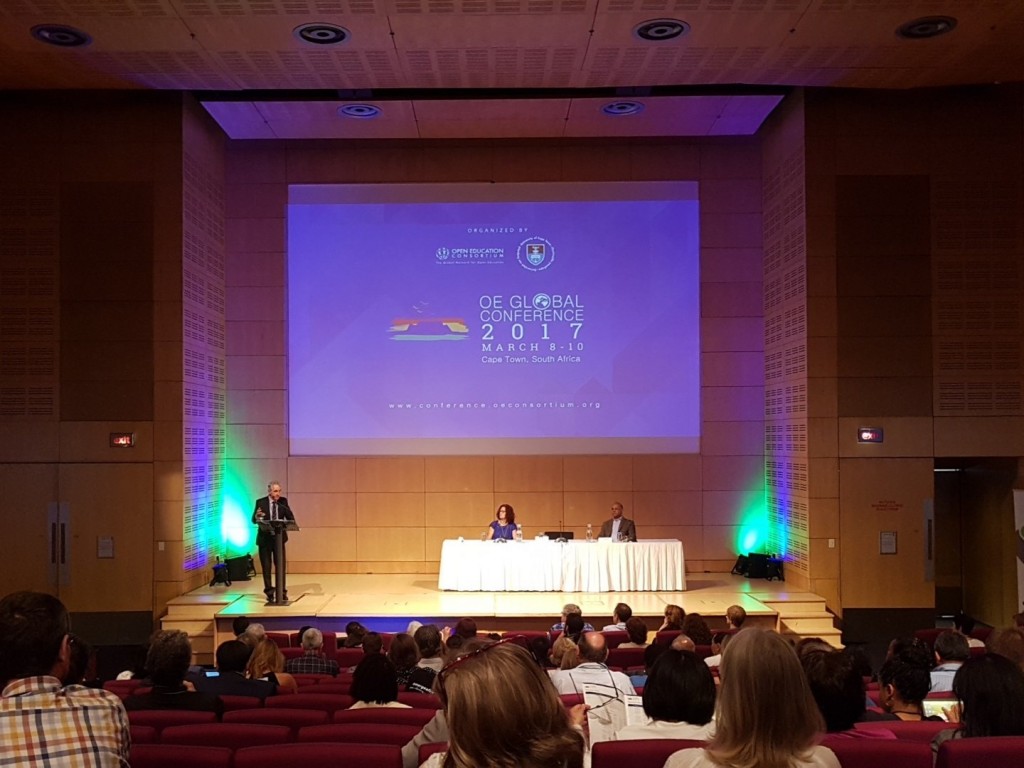
From 8-10 March, Cape Town played host to Open Education Global (#OEGlobal2017), an international conference organised by the Open Education Consortium. Over the 3-day jam-packed initiative, more than 200 delegates from 47 countries engaged in the conference as a place to “discuss, plan, reflect, collaborate, innovate and celebrate openness in education”.
During his opening speech at the conference Dr Max Price, Vice-Chancellor of the University of Cape Town (UCT), emphasised the need for “free decolonised quality” education. Although the importance of open education was clear in his speech, Dr Price highlighted big challenges faced in open education (OE). He stressed the need for OE researchers to focus on finding why access and uptake of open education resources (OER) are not living up to the expectations.
A similar sentiment was expressed by second keynote speaker, Professor Narend Barijnath, CEO of the Council on Higher Education in South Africa who presented the idea that knowledge is a ‘human right” and “public good” and shouldn’t be available to only those who can afford it. While ubiquitous access to education may be the ultimate goal of OE, it faces many challenges, especially in developing countries, where data costs are high and access to technology is limited. Another concern is the quality of the OER produced.
Quality education is understood as a human right and a public good -Narend Baijnath #oeglobal #yearofopen
— Tasneem Jaffer (@NoobPrincess) March 8, 2017
Despite these challenges, many universities have committed themselves to producing content that can be shared freely. As Professor Barijnath said in his speech “OER are here to stay!”. One of the ways this is being accomplished is through Massive Open Online Courses (MOOCs). As part of the MOOC implementation team at the UCT’s, Centre for Innovation in Learning and Teaching, I chose to attend a number of presentations around MOOCs, to understand how MOOCs are being utilised in other contexts.
Besides being a conference participant, I presented on my master’s research. In my presentation entitled, “‘I don’t always wrap MOOCs but when I do…’ – Improving postgraduate students experiences of MOOCS as OERs through facilitation and face-to-face contact” I shared insights into using MOOCs in a blended environment in a postgraduate student setting at UCT. According to my research, even with the use of voluntary local face-to-face facilitator and peer groups, students still struggle with the independent learning that MOOCs often require. The study foregrounded the importance and benefits of face-to-face contact, particularly around the social space, where students are able to have “real” and immediate discussions.
I attended a collaborative session titled “Third Mission of Universities, MOOCs and OERs” which included research from Paola Corti, Cable Green, Joseph Pickett, Rory Mc Greal and Jane-Frances Agbu. Paola Curti presented on the research of Jane-Francis Agbu (who was unable to attend), that foregrounded the issue of the shortage of space in Nigerian universities for high school graduates. While 1.4 million youth qualify for university entrance, there are only 400 000 spaces available. To fill the gap for students who were not able to get a place at the university, a year long MOOC, “The History and Philosophy of Science” was run in collaboration with the Indian Institute of Technology Kanpur. The findings of this study were unexpected; it found that the MOOC missed its intended target audience, as of the 401 participants, 56% were well-educated – having completed a postgraduate degree! This resonates with much of global MOOC research, where MOOC participants are commonly found to be degree-holders.
Another MOOC-related presentation was an Action Lab by colleagues in CILT around the idea of Making Use of MOOCs. Drawing on examples of how MOOCs, both at the level of individual materials and used as a whole or part of a course, are being deployed for a variety of educational purposes, this workshop explored the development of a framework for MOOC re-use.
In addition to MOOCs there were also presentations on other prominent projects incorporating OERs. One such project is the Research on Open Educational Resources for Development project (ROER4D) which presented its work and research on the adoption and impact of OER and associated practices in the Global South (see blog post).
The examples described above are a just a few of the research projects and initiatives taking place in OE around the world which were showcased at the conference. While OEGlobal2017 demonstrated that open education continues to be on the rise, it also highlighted that there are still a number of challenges it faces along the way.
